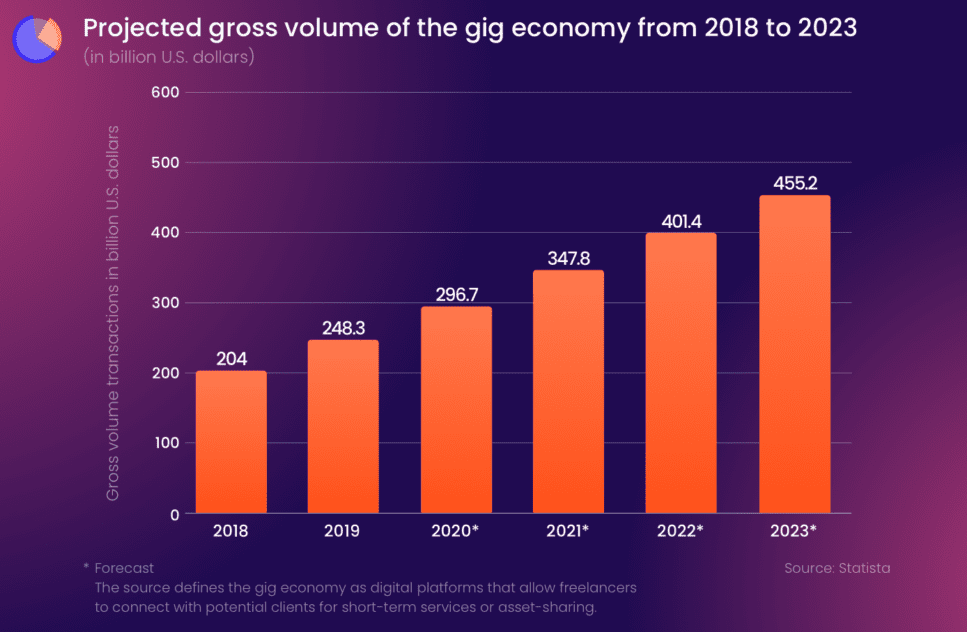The gig economy is a term used to describe a free-market system that is composed of temporary, flexible jobs. This system allows companies to bring on independent contractors and freelancers instead of full-time employees. In recent years, the gig economy has become increasingly popular, with more and more working professionals turning to independent or contract work. This shift has opened up new opportunities for individuals to take control of their careers and work on their own terms. By understanding the gig economy and its opportunities, freelancers and independent contractors can position themselves for success.
One of the primary benefits of working in the gig economy is the flexibility it offers. Gig workers have more control over their schedules and can choose which projects to take on. Additionally, the gig economy provides opportunities to work in a variety of industries, including technology, creative services, and healthcare. This diversity of work can allow individuals to gain valuable experience and develop new skills.
To succeed in the gig economy, freelancers and independent contractors must master essential skills. These include knowing their worth, diversifying their client base, creating a professional brand, networking and collaborating, and managing their time wisely. Additionally, effective independent workers cultivate connections to place, practice, purpose, and people, which can help them navigate the tension between independence and interdependence. By following these tips and best practices, individuals can thrive in the gig economy and build successful careers on their own terms.
Building a Successful Freelance Career
In today’s economy, the gig economy is becoming an increasingly popular option for freelancers and independent contractors. To build a successful freelance career, it is essential to identify your niche and target market. This involves understanding your unique skills and expertise and identifying the types of clients who would benefit from your services. Once you have identified your niche, you can tailor your marketing efforts to reach your target audience and position yourself as an expert in your field.

Building your brand and online presence is also crucial for freelancers and independent contractors. Creating a professional website, social media profiles, and online portfolio can help you showcase your skills and attract potential clients. It is important to establish routines in your work, such as keeping a schedule, following to-do lists, and starting the day with the most challenging work . This can help you stay organized and focused, which is essential for success in the gig economy.
Networking and building relationships with clients is another important aspect of building a successful freelance career. Attend industry events, join online groups and forums, and be proactive about building relationships with potential clients and collaborators. It is also important to manage your time wisely and diversify your client base . Seeking legal guidance on employment contracts, tax law, and other legal issues that arise for gig workers can also be helpful. By following these tips, freelancers and independent contractors can navigate the gig economy and build a successful career.
Navigating the Challenges of the Gig Economy
The gig economy has become a popular option for individuals seeking flexible work arrangements. However, freelancers and independent contractors face unique challenges that require careful management. One of the most significant challenges is managing finances and taxes. Freelancers must handle their own invoicing and billing, as well as set aside money for taxes. It’s essential to keep track of income and expenses and to understand tax laws and regulations to avoid any legal issues. Resources such as the 2022 Freelancer’s Guide to Gig Economy Taxes can be helpful for navigating this challenge.

Balancing multiple clients and projects can also be a challenge for freelancers. It’s crucial to know your worth and diversify your client base to ensure a steady flow of work. Creating a professional brand and networking with other professionals can also help increase job opportunities. Managing time wisely and establishing routines can help freelancers stay organized and productive. However, it’s important to avoid overworking and maintain a healthy work-life balance to avoid burnout.
In conclusion, navigating the gig economy requires careful management of finances and taxes, balancing multiple clients and projects, and maintaining work-life balance. Freelancers and independent contractors must be proactive in managing these challenges to succeed in the gig economy. By understanding the unique challenges of the gig economy and implementing strategies to overcome them, freelancers can thrive in this growing industry.










